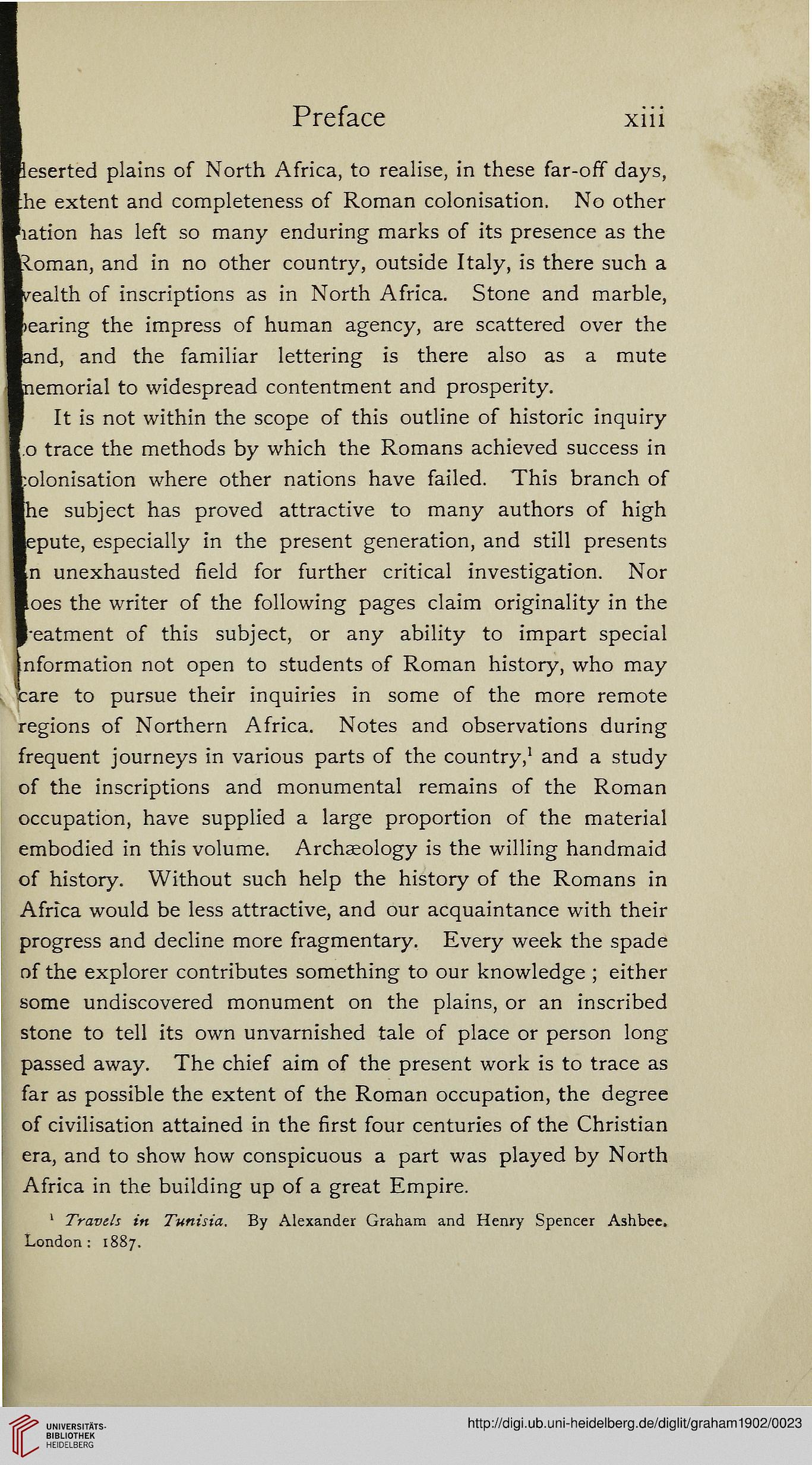Preface
Xlll
eserted plains of North Africa, to realise, in these far-off days,
he extent and completeness of Roman colonisation. No other
lation has left so many enduring marks of its presence as the
3.oman, and in no other country, outside Italy, is there such a
wealth of inscriptions as in North Africa. Stone and marble,
earing the impress of human agency, are scattered over the
nd, and the familiar lettering is there also as a mute
nemorial to widespread contentment and prosperity.
It is not within the scope of this outline of historic inquiry
.o trace the methods by which the Romans achieved success in
:olonisation where other nations have failed. This branch of
he subject has proved attractive to many authors of high
epute, especially in the present generation, and still presents
n unexhausted field for further critical investigation. Nor
oes the writer of the following pages claim originality in the
•eatment of this subject, or any ability to impart special
nformation not open to students of Roman history, who may
'care to pursue their inquiries in some of the more remote
regions of Northern Africa. Notes and observations during
frequent journeys in various parts of the country,1 and a study
of the inscriptions and monumental remains of the Roman
occupation, have supplied a large proportion of the material
embodied in this volume. Archaeology is the willing handmaid
of history. Without such help the history of the Romans in
Africa would be less attractive, and our acquaintance with their
progress and decline more fragmentary. Every week the spade
of the explorer contributes something to our knowledge ; either
some undiscovered monument on the plains, or an inscribed
stone to tell its own unvarnished tale of place or person long
passed away. The chief aim of the present work is to trace as
far as possible the extent of the Roman occupation, the degree
of civilisation attained in the first four centuries of the Christian
era, and to show how conspicuous a part was played by North
Africa in the building up of a great Empire.
1 Travels in Tunisia. By Alexander Graham and Henry Spencer Ashbee.
London: 1887.
Xlll
eserted plains of North Africa, to realise, in these far-off days,
he extent and completeness of Roman colonisation. No other
lation has left so many enduring marks of its presence as the
3.oman, and in no other country, outside Italy, is there such a
wealth of inscriptions as in North Africa. Stone and marble,
earing the impress of human agency, are scattered over the
nd, and the familiar lettering is there also as a mute
nemorial to widespread contentment and prosperity.
It is not within the scope of this outline of historic inquiry
.o trace the methods by which the Romans achieved success in
:olonisation where other nations have failed. This branch of
he subject has proved attractive to many authors of high
epute, especially in the present generation, and still presents
n unexhausted field for further critical investigation. Nor
oes the writer of the following pages claim originality in the
•eatment of this subject, or any ability to impart special
nformation not open to students of Roman history, who may
'care to pursue their inquiries in some of the more remote
regions of Northern Africa. Notes and observations during
frequent journeys in various parts of the country,1 and a study
of the inscriptions and monumental remains of the Roman
occupation, have supplied a large proportion of the material
embodied in this volume. Archaeology is the willing handmaid
of history. Without such help the history of the Romans in
Africa would be less attractive, and our acquaintance with their
progress and decline more fragmentary. Every week the spade
of the explorer contributes something to our knowledge ; either
some undiscovered monument on the plains, or an inscribed
stone to tell its own unvarnished tale of place or person long
passed away. The chief aim of the present work is to trace as
far as possible the extent of the Roman occupation, the degree
of civilisation attained in the first four centuries of the Christian
era, and to show how conspicuous a part was played by North
Africa in the building up of a great Empire.
1 Travels in Tunisia. By Alexander Graham and Henry Spencer Ashbee.
London: 1887.





